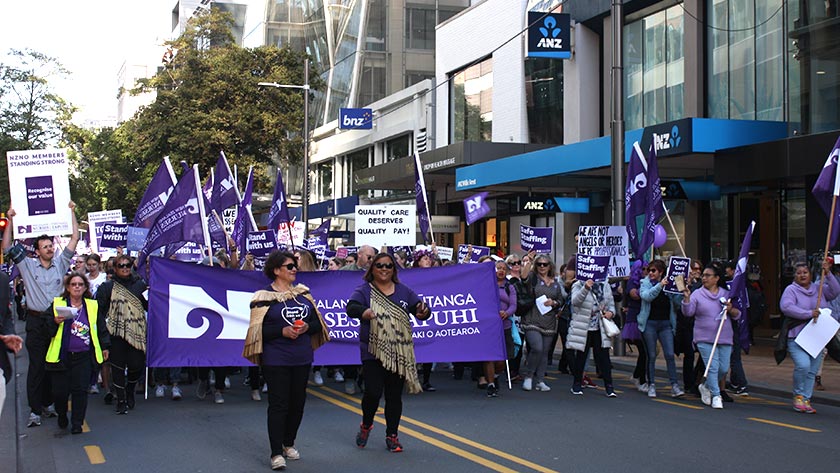NZNO district health board (DHB) members voted in strong numbers to push ahead with strike action on August 19.
The decision to reject the latest offer from DHBs saw Health Minister Andrew Little blame NZNO itself for formulating an offer made to its own members.
It also saw DHBs take NZNO to the Employment Court over life preserving services (LPS) during the upcoming strike action.
NZNO kaiwhakahaere Kerri Nuku said the organisation was disturbed by the DHBs’ actions.
NZNO industrial services manager Glenda Alexander said she was unaware of any DHB facility that did not have its LPS needs met during the first strike on June 9.
“We wonder why the DHBs did not approach us to discuss the matter before issuing a media release about their decision to take this action, which seems just another distraction from meaningful negotiations.”
Alexander said NZNO believed it had met all its obligations and complied with its agreements. “We will continue to do so in the future.”
Alexander said members put a massive effort into ensuring LPS were provided and were gearing up to do the same for the August 19 strike.
She said it was an “affront” to NZNO members who worked hard to ensure LPS was provided. “Our members have bent over backwards to make sure patients were not harmed as a result of strike action, and the services were certainly provided.”
Alexander said the DHBs should instead focus on devising an offer centred on guarantees that safe staffing will be in place every day to ensure the future of safe nursing practice was secure.
Negotiations were set to continue from August 5.
Meanwhile, after the latest vote by members, Minister Little told media that the rejected offer had come from the NZNO itself.
An NZNO statement to members said this was not the case: the organisation was asked for its views by the Government on how to address members’ concerns.
“The Government is the funder of the DHBs and has the ability to address these concerns, so of course we spoke with them. We are making every effort to reach an acceptable deal for members.
“The offer that came through from the DHBs after the discussion with the Government was different to the advice we gave, and particularly different regarding our advice on DHB accountability for unsafe staffing.”
The latest offer was rejected after ongoing bargaining that has focused on pay and safe staffing conditions.
It comes as nursing appears to be in a state of crisis, with an ageing workforce, and offers of better pay and conditions overseas.
Little said to show how seriously the Government took the problems, it would push ahead with a ministerial review of why care capacity demand management (CCDM) systems weren’t in place across all DHBs by the June 30 deadline set for this year in the 2018 MECA.
Only half of the nation’s 20 DHBs met the deadline.
Little said there would be investment to complete the CCDM rollout and a recruitment campaign.
Officials would look to promptly and fairly settle the ongoing pay equity claim, running alongside the MECA, he said.
Notice of the August strike, running for eight hours, was issued on August 2.
Lead advocate David Wait said while the DHBs made promising moves on pay, the offer contained too many ambiguities.
“Members have been clear from the beginning that their safety at work and the safety of their patients is a priority, and that is where they most deserve certainty.
“Better pay will make nursing more attractive, but it is not clear how the DHBs will be held accountable if they do not provide safe staffing. Nurses don’t want more vague promises that the problem will be fixed in the future – which is what we have received once again.”



